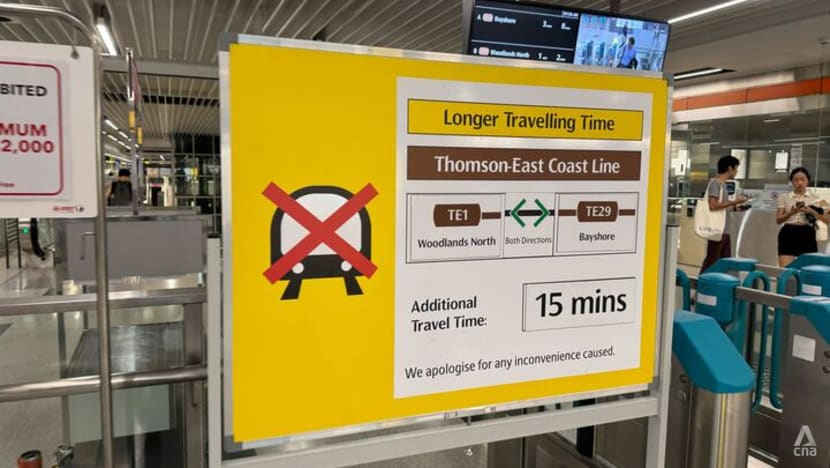LTA and train operators to form rail reliability task force to address service disruptions
The task force will also develop and implement "immediate solutions" to improve rail reliability.

A signal fault caused delays on the Thomson-East Coast Line on Sep 17, 2025. (Photo: CNA/Alvin Chong)

This audio is generated by an AI tool.
SINGAPORE: A rail reliability task force comprising the Land Transport Authority (LTA) and train operators SMRT and SBS Transit will be formed to address service disruptions.
It will also develop and implement "immediate solutions" to improve rail reliability and joint responses to service disruptions, said LTA and the train operators in a joint news release on Friday (Sep 19).
The task force will be chaired by LTA chief executive Ng Lang and include SMRT Group CEO Ngien Hoon Ping, SBS Transit Group CEO Jeffrey Sim and technical specialists from across the rail sector.
It will report its findings to Acting Transport Minister Jeffrey Siow regularly and submit its final recommendations by the end of the year.
RENEWAL PROGRAMME, SERVICE RECOVERY
The task force will review recent train disruption incidents to identify components that are approaching end-of-life and require replacement, upgrading or increased maintenance.
It will also look into bringing forward the renewal programme for the North East Line (NEL) power system, while reviewing ways to strengthen the signalling system for the NEL and Circle Line (CCL) in the short term, before renewal is due.
At the same time, full technical audits of the maintenance and operations of critical systems will be carried out.
These audits include a review of asset conditions, maintenance processes, operational and redundancy procedures, as well as staff training and competency.
"The task force will also review service recovery processes with the view of reducing the impact of service delays to our commuters," said LTA and the transport operators.
"The task force will review procedures to improve service recovery speeds, such as reducing the number of detrainments which impact service recovery time, without compromising on commuter safety."
Training regimes will also be looked at to ensure that officers on the ground can adequately perform service recovery during incidents.
15 incidents in 3 months
LTA, SMRT and SBS Transit provided a list of 15 recent key incidents for review.
Jul 1: TEL service disruption due to a signalling fault. Train services from Napier to Great World stations were affected.
Status: The disruption was due to a faulty computing unit in the signalling equipment housed in Orchard MRT station. The faulty component has been replaced.
Jul 3 and 19: Bukit Panjang LRT service disruption due to a power fault.
Status: A network switch in Bangkit station encountered an intermittent malfunction, resulting in loss of communication to the traction power system. This caused the power supply network to trip for safety reasons. The malfunctioning network switch has been replaced.
Jul 26: Bukit Panjang LRT service disruption due to a power fault affecting the Inner Loop (Service B).
Status: Caused by the train Current Collector Shoe (CCS) on one vehicle having poor contact with the power rail. The CCS has been realigned.
Aug 6: North-South Line (NSL), East-West Line (EWL) service delay due to a point fault after EWL Jurong East station (east bound).
Status: A track point fault caused the start of train services at Jurong East and Kranji stations to be delayed. Faulty cables have been replaced.
Aug 12: Two incidents – NEL and Sengkang-Punggol LRT service disruptions due to a power fault.
Status: A faulty voltage transformer at the Sengkang Depot Intake substation resulted in a double fault, tripping out both primary and secondary protections. The voltage transformer has been replaced.
Aug 15: Sengkang-Punggol LRT service disruption due to a power fault.
Status: A power cable fault between Farmway and Kupang stations resulted in a power outage to the Sengkang-Punggol LRT.
Due to the earlier incident on Aug 12, Sengkang-Punggol LRT was operating on a single intake source from the Sengkang Depot intake substation. The power cable fault resulted in a power outage for the whole network. The power cable has been repaired, and all power cables have been checked.
Aug 28: Downtown Line service disruption due to a point fault affecting services to Bukit Panjang to Beauty World stations.
Status: Due to a mechanical fault in a point machine between Bukit Panjang and Cashew stations (Expo bound). The mechanical fault has been rectified.
Sep 1: CCL service disruption due to a train fault affecting Marina Bay to Promenade stations.
Status: A train between Marina Bay and Bayfront stations stalled and required a haul out by another train. The fault was a result of cable insulation failure connected to an obstacle detector on the train. The cable has been replaced.
Sep 2: NSL service delay due to a train fault affecting Woodlands to Yishun stations.
Status: Signalling equipment on a train near Canberra station malfunctioned and stalled a train, which required a haul-out by another train. A faulty connector was replaced.
Sep 13: Sengkang-Punggol LRT (Punggol) service disruption due to a signalling fault.
Status: A faulty interface component on the signalling system limited the control of trains required for the start of service. The faulty component has been replaced.
Sep 14: NSL service delay due to a train door fault affecting Ang Mo Kio to Newton stations.
Status: Due to a train door fault, a train stalled at the north-bound track at Toa Payoh station (north bound), which required a haul out by another train. The faulty train door component has been replaced.
Sep 16: EWL service disruption due to a signalling fault affecting Aljunied to Tanah Merah stations.
Status: Signalling system lost power arising from a component failure within the Uninterruptible Power Supply system at Eunos station. The power has been restored.
Sep 17: TEL service disruption due to a signalling fault.
Status: The central signalling servers encountered a fault. This required the servers to be rebooted. During this period, the trains were operated manually, which resulted in additional travelling time. Further investigation is ongoing.
The government has earlier set aside an additional S$1 billion (US$779 million) over the next five years to further strengthen rail capabilities, scale up technology adoption and support skills upgrading.
In a Facebook post, Mr Siow said he has tasked LTA to work together with the train operators to speed up asset upgrades, conduct joint technical audits on the critical parts of the rail system and improve service recovery procedures.
"I have asked LTA to share more information with the public on these incidents as we investigate them and the steps we are taking to address them," he added.
"By keeping the public updated, I hope you can better understand the challenges and know that we are fully committed to keeping the network safe and reliable."
He noted the spate of service interruptions on the MRT network and said that the disruptions will be investigated.
"I know commuters are frustrated when disruptions occur, especially after a period over the last few years when our rail reliability has been at a high level.
"Train systems are complex – many things can go wrong, even with redundancies in place."
The National Transport Workers' Union (NTWU) said it supports the efforts of the task force.
"The NTWU stands by our workers and will continue to advocate strongly for the wellbeing of all public transport workers, ensuring that they are equipped with resources and training necessary to contribute effectively towards modernising an ageing transport infrastructure, improving service recovery, while prioritising worker and commuter safety," NTWU executive secretary Yeo Wan Ling said in a Facebook post.
SMRT said on Wednesday that recent train disruptions were unrelated incidents and do not point to wider issues with Singapore's rail network.
"These are isolated cases, not systemic issues," Mr Lam Sheau Kai, the transport operator's president of trains, told the media.
"In each situation, our staff acted swiftly to prioritise commuter safety, deploy recovery measures and provide free bus bridging services."
Mr Lam was speaking after three train disruptions occurred on separate train lines operated by SMRT in four days.
Earlier this month, statistics from LTA showed that MRT reliability over the last 12 months had fallen to its lowest level since 2020.
According to a rail service reliability report published on Sep 5, the MRT network on average clocked about 1.6 million train-km from July 2024 to June 2025 without service delays lasting more than five minutes.
This is the shortest distance trains have travelled without service delays since 2020, when trains clocked about 1.45 million train-km between delays.
















